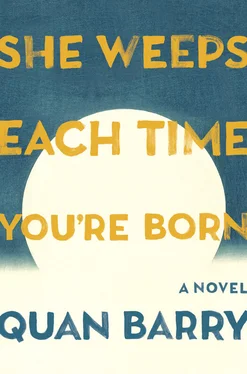Tu bent over to zipper the bag closed. He was careful not to look at the face of his beloved, her hair pooling like a dark star behind her head. Under the full rabbit moon he caught a glimpse of her hand gleaming in the moonlight. He touched her finger, a small bead glistening on the tip. He picked up her cold hand and put it to his lips. It was honey.

In the beginning the words were all in her head along with memories of sulfurous clouds and leaf-nosed bats blessing her with their leathery wings. Perhaps we are the reason she didn’t utter a single word for so long. The truth is during those first years of total silence, people hardly noticed. Why talk to the living when she had us? And if they had noticed her lack of speech, if they had wondered, what would they have seen? The way at dusk this baby girl would sometimes look at empty air, nothing there at all, and begin to weep?
SOMETHING WAS WRONG WITH THE LEFT SIDE OF BÀ’S BODY, and they were still hours from the coast. We should have left sooner, Huyen grumbled, eyeing the sun, her cheek packed with old betel leaves she’d already chewed. At this rate they wouldn’t reach the highway by nightfall and would have to sleep outside again. Huyen wasn’t even sure she wanted to reach the highway at all and now this — Bà with a sudden inclination to walk to the left, body listing like a boat. It was gradual. If the path were straight, within a few hundred yards she would be on the verge of walking off the trail as if headed into the muddy waters of the Serepok.
Huyen had first noticed a change days earlier as they packed up their belongings beside Lak Lake. Qui had been sitting under a palm tree plaiting her endless hair into two thick braids, the baby nested in her lap. In the distance a trio of elephants trundled across the shallows, their handlers nowhere to be seen. A canoe floated by carrying some of the local M’Nong people, the boat weighted down with housewares and livestock. It was then as Bà bustled around the yard loading the two-wheeled cart that Huyen noticed how the left side of her face appeared as if melting, the skin going slack. It’s just age, Huyen thought, and put it from her mind.
In their two rooms by the shores of Lak Lake she and Bà had argued about what to do if the central highlands fell. Would it be safer to be part of the fleeing millions pushing south all the way to Saigon on Highway 1, or should they stay clear of the masses and use forgotten trails like this? Bà had said it ran all the way from Cambodia to the coast in one form or another. From her girlhood she remembered new recruits arriving at the rubber plantation near Kontum, the people trudging in from a week’s march on the trail, their faces haggard. How the overseer would immediately hand them each a tin bucket and send them out.
In the end Huyen decided they would go as far as they could on small trails following the Serepok east until it hit the Song Cai. From the highlands it was seventy-five miles to the coast. Nights they would sleep in what remained of the brush. In the coastal city of Nha Trang they would join the masses on Highway 1 and push south. Secretly Huyen feared the highway. She had seen mass exoduses before. The lawlessness, the air like tinder. The population realigning itself because somewhere far away somebody had drawn a line on a map, the population fleeing because everyone else was fleeing.
Huyen surveyed the trail ahead of them, the terrain jungly and overgrown. From the looks of it the journey would only get tougher. If you put in the work to sharpen steel, eventually it will turn into needles, she growled, but the adage didn’t lift her spirits. Silently they trudged forward, the only sound the cart’s wheels rutting the earth as Qui pulled it along.
Their fourth day on the trail was hot, but they were used to it. The elephant grass scratched their necks. Small brown burrs stuck in their hair, the sound of the Serepok always in the distance. The full face of the lidless sun shadowed them on their way. Each day their skin grew darker, except for Qui, who stayed the same ghostly hue as she pulled the cart along using a wooden bar built for an animal. The baby sat in the cart along with Huyen and some bamboo mats, a few utensils including a rusty cleaver which they used on chicken they were able to catch on the outskirts of abandoned villages. On the second night of their journey, outside the hamlet of Son Trinh, Bà had brandished the cleaver when they heard something rustling in the elephant grass. Who goes there, Bà whispered, but nothing appeared. As a precaution she had taken to sleeping with the cleaver under her head. Already if she lay down without it she couldn’t sleep.
Mornings she blamed her dreams on it. Ever since her eyes had soured, her dreams had dissolved into fuzzy splotches of color. But since sleeping with the cleaver under her head, Ba’s dreams had taken on a new brilliance, images clear as day. An orange spider the size of a crab lurking in the trees. A white horse grazing under a colony of bats. The French Foreign Legion officer coming toward her with his cold gray eyes, the tip of his burning cigarette that already smelled of scorched skin. Each night, dreams like a river of memories bearing her away in the current.
It was almost noon. Tomorrow they would reach the coast. Qui stopped for a moment and wiped her forehead. She could feel the ends of her braids tickling the backs of her calves. Her breasts hurt. The baby was taking less and less, but her body was producing more and more. Evenings the milk ran silver in the light of the fire as it leaked from her nipples. Along with her ghostly white skin it was her one miracle. Her chest burned day and night. Mornings the ground was damp where she’d slept.
Already the baby was no longer a baby. She was four in the ancient system of reckoning, the months counted in which the unborn are forming in the dark caves of their mothers. Traditionally it was said babies arrived fully one year old with their little old-man faces wrinkled and red, their old souls hardening in new vessels.
When he had first pulled her from the body bag buried in the ground, Tu had held her up in the light of the full rabbit moon. Love, he whispered. Ai . The air glittered with soot. He held her high above his head, letting the silver light bathe every inch of her. The goddess be praised, said Bà, bowing her head and clapping her hands in prayer. Huyen and Qui stood silent. Ash drifted through the sky, sparkling as if sprinkled with mica, then going leaden as it hit the earth.
When Tu brought the baby down out of the moonlight, she was completely clean. No blood or waxy yellow slick coated her skin, everything just soft and shining, her small cap of black hair fragrant as honey.
That night standing by the grave Huyen had spit a long dark stream in the dirt. Love, she growled. She reached over and took the baby from Tu, then handed it roughly to Qui. You name your child Love and the gods will be jealous, she said. The way she looked at him, the heavy furrows gathering between her eyes. As if to say, don’t you know anything?
Tu didn’t argue. His true love lay cold and dead in a makeshift wooden box at his dirty feet, her head resting in the bowl of her hat. A piece of ash blew into his ear. Frantically he tipped his head. As he pawed at his ear, he didn’t see the ring of white words beaming up into the night, the poem he had paid for long ago in its entirety. In the long river, fish swim off without a trace / Fated in love, we can wait a thousand years / Who tends the paddy, repairs its dike / Whoever has true love shall meet / But when?
Читать дальше













